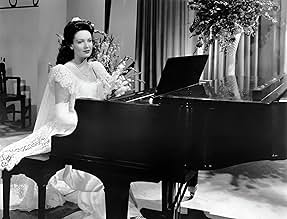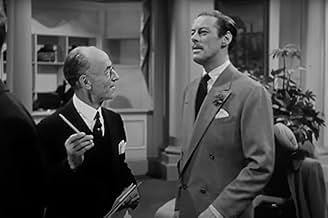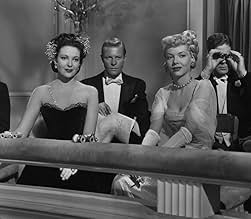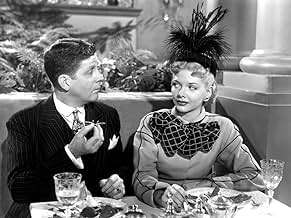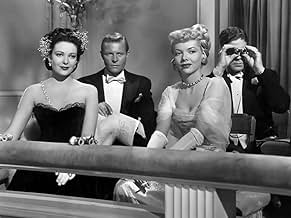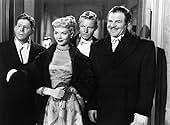IMDb रेटिंग
7.4/10
6.1 हज़ार
आपकी रेटिंग
अपनी भाषा में प्लॉट जोड़ेंA man dreams of revenge when he suspects his wife is unfaithful.A man dreams of revenge when he suspects his wife is unfaithful.A man dreams of revenge when he suspects his wife is unfaithful.
- पुरस्कार
- कुल 1 जीत
Al Bridge
- House Detective
- (as Alan Bridge)
Abdullah Abbas
- Concert Attendee
- (बिना क्रेडिट के)
Pati Behrs
- Minor Role
- (बिना क्रेडिट के)
George Beranger
- Maître d'hôtel
- (बिना क्रेडिट के)
Evelyn Beresford
- Madame Pompadour
- (बिना क्रेडिट के)
Georgia Caine
- Dowager in Concert Box
- (बिना क्रेडिट के)
James Carlisle
- Concert Attendee
- (बिना क्रेडिट के)
Harry Carter
- Reporter
- (बिना क्रेडिट के)
Bill Cartledge
- Page Boy
- (बिना क्रेडिट के)
फ़ीचर्ड समीक्षाएं
6sol-
As he conducts a symphony in a crowded concert hall, an esteemed musician imagines different ways to deal with his wife's reported infidelity in this Preston Sturges comedy. Rex Harrison is perfectly posh, snobby and indignant in the lead role, though his character is more than a little hard to relate to as he simply assumes that his wife has been unfaithful based on hearsay without ever confronting her and without any real evidence. In this regard, the film plays out a lot like 'Othello', though with a pronounced black comedy streak as some of Harrison's imagined solutions to the issue are really rather grisly. In arguable bad taste or not, 'Unfaithfully Yours' is laugh-out-loud funny at its best with the zaniest moments coming from Harrison later trying to act on his imagined scenarios, only to find himself foiled by unreliable technology and other things that get in the way. The film is incredibly slow to build up though, with over 45 minutes elapsing before Harrison starts to concoct revenge scenarios. While this build-up does allow us to get under his skin a bit better, it also makes him seem all the more foolish for not doing anything more to confirm the suspected infidelity. A rather nice touch of the movie is how his anger gives him the fuel to conduct more brilliantly than ever, but this is not a first rate Sturges comedy, even if it certainly never once bores.
This film brings us Rex Harrison already foreshadowing Professor Higgins. He tries out the arrogant, picayune, verbally acute role and is absolutely successful. The seed is planted and we, who know what is to come twenty years hence, rub our hands gleefully in anticipation of Higgins. But Linda Darnell is no Eliza. Instead, she is a loving, docile, trusting wife, already dressed as though she will be meeting the Queen and looking beautiful and so very desirable.
The dialog crackles and moves fast. Only Rex Harrison and perhaps Cary Grant could have have delivered with the wit and brio that Sturges deserved.
There are two extended slapstick scenes that should have been cut shorter.
Edgar Kennedy as a Private Eye has a couple of great scenes when he turns out to be a classical music devotee and is knowledgeably enthusiastic about Harrison's conducting.
A digression: Harrison tosses a couple of tickets to the Philharmonic concert, they are orchestra tickets a few rows from the front row. Price $3.80, designated as "Patron"' seats.
The dialog crackles and moves fast. Only Rex Harrison and perhaps Cary Grant could have have delivered with the wit and brio that Sturges deserved.
There are two extended slapstick scenes that should have been cut shorter.
Edgar Kennedy as a Private Eye has a couple of great scenes when he turns out to be a classical music devotee and is knowledgeably enthusiastic about Harrison's conducting.
A digression: Harrison tosses a couple of tickets to the Philharmonic concert, they are orchestra tickets a few rows from the front row. Price $3.80, designated as "Patron"' seats.
Rex Harrison is a temperamental conductor and Linda Darnell his younger, adoring wife in "Unfaithfully Yours," also starring Lionel Stander, Rudy Vallee, and Kurt Krueger. Harrison and his wife are so much in love, it's sickening. But thanks to interference from his brother-in-law (a subdued Rudy Vallee), Harrison begins to believe that while he was out of town, his beautiful wife (Darnell) was consorting with his secretary, Tony, played by blond, handsome Kurt Krueger. As he conducts the orchestra in concert that evening, Harrison imagines several scenarios - one in which he kills his wife and cleverly frames Tony for the murder; one in which he pays her off; and one where he challenges Tony to a game of Russian roulette. Of course, when he actually tries to carry them out, things don't go as he imagined.
This is a hilarious movie, with Harrison absolutely magnificent - and I might add, totally unlikable. One wonders if Darnell will stay with him once the bloom is off the rose. Lanky and sure of himself, though not particularly handsome, Harrison has a certain magnetism, not to mention a snappy way with a line. "Will I see you tonight at the concert?" Vallee asks him. "Yes!" Harrison yells. "I'm generally there on the nights when I conduct!" His last scene alone in the apartment is a scream, mainly because Harrison doesn't go for laughs but takes the whole thing very seriously and in character. Darnell is beautiful and appropriately cloying. Edgar Kennedy, as a classical music loving detective, has a wonderful scene with Harrison.
I haven't seen the remake, but I noticed its voting average is lower than the original's. I can imagine Dudley Moore being quite funny, but this role, with its arch egotism, was tailor-made for Harrison.
This is a hilarious movie, with Harrison absolutely magnificent - and I might add, totally unlikable. One wonders if Darnell will stay with him once the bloom is off the rose. Lanky and sure of himself, though not particularly handsome, Harrison has a certain magnetism, not to mention a snappy way with a line. "Will I see you tonight at the concert?" Vallee asks him. "Yes!" Harrison yells. "I'm generally there on the nights when I conduct!" His last scene alone in the apartment is a scream, mainly because Harrison doesn't go for laughs but takes the whole thing very seriously and in character. Darnell is beautiful and appropriately cloying. Edgar Kennedy, as a classical music loving detective, has a wonderful scene with Harrison.
I haven't seen the remake, but I noticed its voting average is lower than the original's. I can imagine Dudley Moore being quite funny, but this role, with its arch egotism, was tailor-made for Harrison.
Unfaithfully Yours (1948)
I've never quite loved Preston Sturges as a director or Rex Harrison as an actor, so having the two of them together here didn't bode well, and I thought I'd announce my bias. And sure enough, on this second viewing I was reminded of a kind of crisp calculation that both of them have. Sturges makes amazing movies, no question, and the best of them (Palm Beach Story is my favorite) are hilarious classics. To see this one for what it offers you might first see a classic Sturges screwball from 1941 or 1942. But even those are clinical at heart (if they have a heart), so it's a little like sipping a very dry, clean martini and getting drunk. Alone. No olives. Wit and sophistication do better in the hands of Cole Porter, somehow, but see for yourself.
Harrison the actor overcomes his harsh demeanor in a movie like My Fair Lady because the music and the style there give him some kind of liberty, but here he is supposed to be sympathetic in his demented cruelty, and I only wish him failure. He is, to be sure, plotting the death of his wife. Three times. And then the fourth, beyond the symphony podium, with its madcap bedlam. It's funny in that zany way you have to laugh at. And you will laugh.
I love classical music and like the structure of the film, but as usual with Sturges, this structure makes the whole process detached and too too clever. Sturges himself wrote the screenplay for this idea way back in 1932, and if it had been shot then, before the Hays code, before the real rise of screwball, we would have had a very different movie. But what we have here is admirable and interesting, for sure, if not the zinger it could have been with a different tilt.
I've never quite loved Preston Sturges as a director or Rex Harrison as an actor, so having the two of them together here didn't bode well, and I thought I'd announce my bias. And sure enough, on this second viewing I was reminded of a kind of crisp calculation that both of them have. Sturges makes amazing movies, no question, and the best of them (Palm Beach Story is my favorite) are hilarious classics. To see this one for what it offers you might first see a classic Sturges screwball from 1941 or 1942. But even those are clinical at heart (if they have a heart), so it's a little like sipping a very dry, clean martini and getting drunk. Alone. No olives. Wit and sophistication do better in the hands of Cole Porter, somehow, but see for yourself.
Harrison the actor overcomes his harsh demeanor in a movie like My Fair Lady because the music and the style there give him some kind of liberty, but here he is supposed to be sympathetic in his demented cruelty, and I only wish him failure. He is, to be sure, plotting the death of his wife. Three times. And then the fourth, beyond the symphony podium, with its madcap bedlam. It's funny in that zany way you have to laugh at. And you will laugh.
I love classical music and like the structure of the film, but as usual with Sturges, this structure makes the whole process detached and too too clever. Sturges himself wrote the screenplay for this idea way back in 1932, and if it had been shot then, before the Hays code, before the real rise of screwball, we would have had a very different movie. But what we have here is admirable and interesting, for sure, if not the zinger it could have been with a different tilt.
Golden-Age Hollywood screwball fabricator Preston Sturges' last feature film worthy of his caliber, UNFAITHFULLY YOURS stars Rex Harrison as a renowned conductor Sir Alfred de Carter, on the eve of his concert, he is deviled by the paranoia that his much younger wife Daphne (Darnell) might have an extramarital affair with his personal secretary Anthony Windborn (Kreuger) thanks to his philistine brother-in-law August Henshler (Vallée)'s presumptuous misconstruction.
The apprehension and exasperation of being cuckolded hangs like a rock over Alfred's mind and Sturges only knows all too well, that for a man of Alfred's Brobdingnagian ego, the last thing to do is to lay bare his suspicion point blank in front of Daphne, from blunt rebuke to mounting curiosity, until firmly convinced by the circumstantial evidence, it all comes down to an increasingly fractious Alfred envisages three possible outcomes when wielding his baton in front of a full symphony orchestra and a full-house audience.
Every scenario is pertinently induced by a different classical piece from romantic-era he conducts and introduced by a cracking zooming-in shot right into Alfred's eyeball, the overture of Rossini's baroque SEMIRAMIDE triggers a murderous plan A which a framed Anthony to take the rap, yet what Wagner's operatic TANNHÄUSER suggests is a plan B with lenience and munificence, whereas plan C of a Russian roulette derring-do is influenced by Tchaikovsky's symphonic poem FRANCESCA DA RIMINI, a special treat for musos and cinephiles alike.
Sardonically, reality is, more often than not, not exactly what we have imagined, so during his execution of one of the plans after the concert (interestingly, the choice of the plan betrays Sturges' arch amalgamation of comedy and morbidness), a knockabout transpires in a slightly labored fashion which plays up to Alfred's clumsiness, and he is merely stuck in the preparatory step with the "so-simple-it-operates-itself" home recording unit when Daphne returns, thus an air-clearing finale is all we need to put everything back to the status quo.
A motormouthed Rex Harrison simulates a great impression as a conductor and relishes Sturges' long-winded screenplay which jollily throws barbs to the folly of machismo, meanwhile, Linda Darnell is hobbled as a virtuous beauty with a little more to act (albeit it is all in one's figment), yet, quintessentially it is Sturges' trademark witticism and sleight-of-hand that marks this oldie a treasure to be appreciated by posterity and here is the takeaway quip to round off my review - "If there is one reassuring thing about airplane, they always come down."
The apprehension and exasperation of being cuckolded hangs like a rock over Alfred's mind and Sturges only knows all too well, that for a man of Alfred's Brobdingnagian ego, the last thing to do is to lay bare his suspicion point blank in front of Daphne, from blunt rebuke to mounting curiosity, until firmly convinced by the circumstantial evidence, it all comes down to an increasingly fractious Alfred envisages three possible outcomes when wielding his baton in front of a full symphony orchestra and a full-house audience.
Every scenario is pertinently induced by a different classical piece from romantic-era he conducts and introduced by a cracking zooming-in shot right into Alfred's eyeball, the overture of Rossini's baroque SEMIRAMIDE triggers a murderous plan A which a framed Anthony to take the rap, yet what Wagner's operatic TANNHÄUSER suggests is a plan B with lenience and munificence, whereas plan C of a Russian roulette derring-do is influenced by Tchaikovsky's symphonic poem FRANCESCA DA RIMINI, a special treat for musos and cinephiles alike.
Sardonically, reality is, more often than not, not exactly what we have imagined, so during his execution of one of the plans after the concert (interestingly, the choice of the plan betrays Sturges' arch amalgamation of comedy and morbidness), a knockabout transpires in a slightly labored fashion which plays up to Alfred's clumsiness, and he is merely stuck in the preparatory step with the "so-simple-it-operates-itself" home recording unit when Daphne returns, thus an air-clearing finale is all we need to put everything back to the status quo.
A motormouthed Rex Harrison simulates a great impression as a conductor and relishes Sturges' long-winded screenplay which jollily throws barbs to the folly of machismo, meanwhile, Linda Darnell is hobbled as a virtuous beauty with a little more to act (albeit it is all in one's figment), yet, quintessentially it is Sturges' trademark witticism and sleight-of-hand that marks this oldie a treasure to be appreciated by posterity and here is the takeaway quip to round off my review - "If there is one reassuring thing about airplane, they always come down."
क्या आपको पता है
- ट्रिवियाThe camera zooms to a big close-up of Sir Rex Harrison's left eye just before fading to each of Alfred De Carter's infidelity fantasies. Harrison happened to be blind in that eye, the result of childhood measles.
- गूफ़The "recording machine" Rex Harrison was trying to use in his fantasy was not a recording machine at all but a Garrard RC-100 flip-over 1938 record changer.
- भाव
Alfred: Have you ever heard of Russian Roulette?
Daphne De Carter: Why, certainly. I used to play it all the time with my father.
Alfred: I doubt that you played Russian Roulette all the time with your father!
Daphne De Carter: Oh, I most certainly did. You play it with two decks of cards, and...
Alfred: That's Russian Bank. Russian Roulette's a very different amusement which I can only wish your father had played continuously before he had you!
- कनेक्शनEdited into Myra Breckinridge (1970)
- साउंडट्रैकFrancesca da Rimini, Opus 32
(1876) (uncredited)
Music by Pyotr Ilyich Tchaikovsky (as Peter Ilystch Tchaikowski)
Played during the opening credits, at the concert and often in the score
टॉप पसंद
रेटिंग देने के लिए साइन-इन करें और वैयक्तिकृत सुझावों के लिए वॉचलिस्ट करें
- How long is Unfaithfully Yours?Alexa द्वारा संचालित
विवरण
- रिलीज़ की तारीख़
- कंट्री ऑफ़ ओरिजिन
- आधिकारिक साइटें
- भाषा
- इस रूप में भी जाना जाता है
- Symphony Story
- फ़िल्माने की जगहें
- उत्पादन कंपनी
- IMDbPro पर और कंपनी क्रेडिट देखें
- चलने की अवधि
- 1 घं 45 मि(105 min)
- रंग
- पक्ष अनुपात
- 1.33 : 1
इस पेज में योगदान दें
किसी बदलाव का सुझाव दें या अनुपलब्ध कॉन्टेंट जोड़ें



